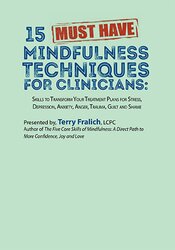15 Must-Have Mindfulness Techniques for Clinicians: Skills to Transform Your Treatment Plans for Stress, Depression, Anxiety, Anger, Trauma, Guilt and Shame
Credit Available - See CEUs tab below.
- Categories:
- Anxiety | Mindfulness | Trauma and PTSD
- Faculty:
- Terry Fralich, LCPC
- Duration:
- 6 Hours 21 Minutes
- Format:
- Audio and Video
- Original Program Date:
- 22 Feb, 2021
- SKU:
- POS053610
- Media Type:
- Online Learning
Description
From depression and anxiety to stress and trauma, mindfulness has demonstrated its ability to help reduce suffering. With all its benefits, mindfulness is now widely used in clinical practice. There are literally hundreds of mindfulness interventions available to clinicians. But with so many to choose from, how do you know which to use? How do you decide on your “go-to” techniques?
Terry Fralich has studied extensively with His Holiness the Dalai Lama and with some of the American pioneers in the mindfulness field. With more than 20 years teaching mindfulness and using mindfulness techniques in his clinical practice, Terry has distilled the sea of available techniques into the essential hands-on mindfulness skills and exercises you need to treat your clients.
Join Terry, and learn to effectively use 15 mindfulness practices you can incorporate into your treatment plans for depression, anxiety, stress, and trauma. Terry will guide you through the specific exercises that he’s found most capable in shifting clients away from stress responses, intervening in the downward spiral of depression and anxiety, and cultivating safety and groundedness in traumatized clients. In addition, he’ll give you detailed instruction on his top mindfulness interventions to help your clients properly deal with guilt and shame and empower them to manage their anger and toxic emotions.
As an additional benefit, you’ll have the opportunity to practice the application of what you’ve learned under Terry’s expert supervision.
Enhance your clinical practice with mindfulness skills that work!
CEUs
This course is available for 6.25 total CPDs.
The HPCSA has declared that any on-line courses CPD/CEU credited by a certified US board, is automatically CPD/CEU credited in South Africa.
As there are different boards for different disciplines, we at Acacia suggest that you use the Counselling CPD/CEU credits. These correspond to South African credits of one CPD/CEU per 60 minutes. If you choose to use your discipline's credits, please do so at your discretion.
PESI, Inc. is an approved provider with the Florida Board of Clinical Social Work, Marriage and Family Therapy and Mental Health Counseling. Provider Number 50-399. This self-study course qualifies for 6.25 continuing education credits.
Handouts
| File type | File name | Number of pages | |
|---|---|---|---|
| Manual - 15 Must-Have Mindfulness Techniques for Clinicians (2.5 MB) | 122 Pages | Available after Purchase | |
| Manual - 15 Must-Have Mindfulness Techniques for Clinicians - French (2.5 MB) | 122 Pages | Available after Purchase | |
| Manual - 15 Must-Have Mindfulness Techniques for Clinicians - Italian (2.5 MB) | 122 Pages | Available after Purchase | |
| Manual - 15 Must-Have Mindfulness Techniques for Clinicians - German (2.5 MB) | 122 Pages | Available after Purchase | |
| Manual - 15 Must-Have Mindfulness Techniques for Clinicians - Spanish (2.5 MB) | 122 Pages | Available after Purchase |
Objectives
- Assess the neurological processes and how mindfulness can to increase client’s motivation.
- Determine how mindfulness practices can be used to shift clients to a relaxation response.
- Integrate mindfulness interventions into your treatment plans to counter automatic patterns of negative thoughts.
- Demonstrate how mindfulness and breathing techniques can be practiced in-session to increase emotion regulation.
- Analyze the neurobiology of the traumatized brain and implement grounding techniques and breathing exercises.
- Appraise the clinical utility of mindfulness-based therapies in regulating shame and guilt.
Outline
Reduce Stress with Mindful Coping Skills- Educate the client about the impact of stress
- Practice makes perfect – transform the stress response
- Exercises
- Strengthen awareness of the stress response
- Shifting to relaxation response: cultivate a foundation of groundedness, settledness, and ease
- Mindful transitions
- Treatment limitations, risks and research
- The downward spiral and the brain’s default mode
- Cultivate motivation and action
- Witness the anxious mind
- Get unstuck from anxious rumination
- Exercise:
- Self-regulation practices for anxiety
- Understand the sources of anger
- The body’s anger response
- Identify early signs of the anger forest fire
- Clarify the practice: What am I trying to remember?
- Exercise:
- Rehearsal of the Stop-Breathe-Reflect-Choose practice
- Proceed with caution – avoid retriggering and retraumatizing
- Retrain the dysregulated nervous system
- Cultivate safety
- Exercises:
- Grounding techniques
- Breathing techniques
- Positive visualization
- Identifying primary core negative belief
- Cultivating a healthy and true vision of self
- Exercises:
- The protective quality of mantras
- Exercises that promote self-forgiveness
Target Audience
- Counselors
- Social Workers
- Psychologists
- Marriage and Family Therapists
- Occupational Therapists
- Addiction Counselors
- Case Managers
- Therapists
- Nurses
- Other Mental Health Professionals
Please wait ...


